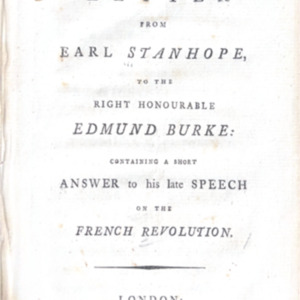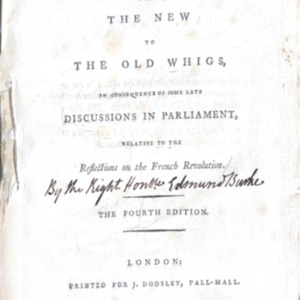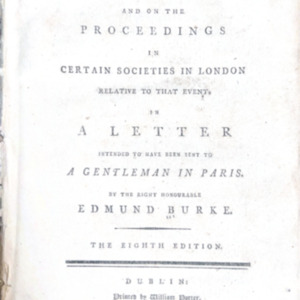In Their Own Words: The French Revolution in Print
Commentary from Britain: Edmund Burke
The Whig politician Edmund Burke was a staunch critic of the French Revolution, famously expressing his opposition in Reflections on the Revolution in France (1790). He argued that the Revolution’s radical break from tradition would lead to chaos, violence, and tyranny, which he believed was confirmed by the Reign of Terror. His work became a foundational text for modern conservatism, emphasizing gradual change and the importance of historical institutions.
This perspective from abroad offers valuable insight into how the French Revolution was perceived outside of France, particularly by those with their own vested interests in monarchy and tradition. Burke brought a distinctly conservative viewpoint shaped by his loyalty to the British constitutional monarchy. His critique, while rooted in concern for stability and order, also reveals a deep anxiety about the revolutionary rejection of inherited institutions and social hierarchies. Burke’s position was not entirely impartial; as a subject of a monarchy himself, he naturally sympathized with the plight of the French crown. Nevertheless, his analysis provides a politically nuanced and philosophically grounded critique of the Revolution’s more radical impulses, offering a counterpoint to the revolutionary fervor spreading across Europe.

A Letter from Earl Stanhope to the Right Honorable Edmund Burke offers a direct rebuttal to Burke’s influential Reflections on the Revolution in France, which had been published earlier that year. In this letter, the British politician and reformer Earl Stanhope responds to Burke’s conservative critique of the French Revolution, challenging his assertions and defending the revolutionary ideals of liberty, equality, and fraternity.
Burke had criticized the French Revolution for its radical break with tradition, its disregard for established institutions, and its potential to lead to chaos and tyranny. Stanhope, however, offers a more optimistic view of the Revolution, arguing that it represents the birth of a new and more just political order, one based on the will of the people rather than the divine right of kings or aristocratic privilege.

In this powerful political treatise, Edmund Burke defends the arguments he made in his earlier work, Reflections on the Revolution in France, responding to criticism from his contemporaries—particularly former allies within the Whig Party. Published in 1791, Burke’s Appeal draws a sharp distinction between what he viewed as true constitutional reform and the radical, destabilizing upheaval unfolding in France.

Published in 1790, less than a year after the storming of the Bastille, Edmund Burke’s Reflections on the Revolution in France stands as one of the most influential, and controversial, responses to the early stages of the French Revolution. A British statesman and philosopher, Burke was deeply disturbed by what he saw as the Revolution’s assault on tradition, hierarchy, and inherited rights. His Reflections articulated a conservative critique that would shape political discourse for generations to come.
Framed as an open letter to a young Frenchman, Burke’s text warns against the dangers of radical reform and abstract idealism. While many in Britain initially celebrated the French Revolution as a parallel to their own Glorious Revolution of 1688, Burke rejected the comparison outright. He viewed the events in France not as a path to liberty, but as a descent into anarchy, destined to culminate in violence and despotism.